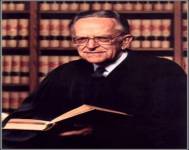Early life
Harry A. Blackmun grew up in a working-class suburb of St. Paul, Minnesota. Blackmun attended Harvard where he graduated with a degree in mathematics summa cum laude in 1929. Although he considered going to medical school, Blackmun chose to attend Harvard Law School and graduated in 1932.
Career
After graduating law school, Blackmun clerked for Judge John B. Sanborn of the United States Court of Appeals for the Eighth Circuit. After his clerkship ended, he went into private practice where he worked on civil litigation, tax, and trust and estate matters. Blackmun also served as an associate professor at both the William Mitchell College of Law and University of Minnesota Law School.
After spending a number of years in private practice at the firm now known as Dorsey & Whitney, Blackmun became counsel for the Mayo Clinic in Minnesota from 1950 to 1959. In 1959, President Dwight D. Eisenhower appointed Blackmun to the U.S. Court of Appeals for the Eight Circuit. He authored 217 opinions. Eleven years later in 1970, President Richard Nixon appointed Blackmun to the Supreme Court of the United States.
Supreme Court
Blackmun joined the Supreme Court at the time when Warren Burger, Blackmun’s childhood friend and best man at his wedding, was Chief Justice. Blackmun and Chief Justice Burger were often referred to as the “Minnesota Twins.” Blackmun had been a Republican his whole life, and it was expected he would follow along with the conservatives on the Supreme Court. This was the case early on in his career as a Justice, such as when he dissented with Burger and two others in Furman v. Georgia, which declared all capital punishment unconstitutional. Blackmun’s conservative ideology seemed to slowly change the longer he was on the court. Most notably, in 1973 Blackmun authored the majority decision in Roe v. Wade, a landmark case that invalidated a Texas statute that made abortion in most circumstances illegal.
In later cases heard by the Court, Blackmun’s vote always preserved the integrity of Roe v. Wade. In 1989 he wrote a dissent in Webster v. Reproductive Health Services, articulating his fears that the Court was trying to overrule Roe. Also, in Planned Parenthood v. Casey (1992), Blackmun fiercely criticized the majority for their attack and almost overturning of the Roe decision.
In 1993, Blackmun argued in Herrera v. Collins that refusing to allow convicted prisoners to introduce new evidence to prove their innocence could be considered “perilously close to simple murder.” Herrera v. Collins, 506 U.S. 390, 446 (1993).
In one of his most famous dissents, Blackmun wrote of his despair for a young child who was left with severe brain-damage after Child Services failed to take away custody from his abusive father. Blackmun’s distress for this young boy was evidenced by one of the phrases used in his dissent. “Poor Joshua!,” was referenced by many when discussing both the case and Blackmun’s history on the Supreme Court. Deshaney v. Winnebago County Dep’t of Social Services, 489 U.S. 189, 213 (1989).
In 1994, after serving as a Justice for 24 years, Blackmun retired.
Later years
In 1997, Blackmun starred in a Steven Spielberg film called Amistad where he portrayed Justice Joseph Story. He is the only Supreme Court justice to play a judge in a film. After hip surgery in 1999 where he suffered complications, Blackmun passed away on March 4, 1999. He is buried at Arlington National Cemetery.
In 2004, the Library of Congress released Blackmun’s extensive files to the public. These files included notes on every Supreme Court case heard while Blackmun was a Justice as well as other documents that gave the public an inside look at the Supreme Court during Blackmun’s term.








